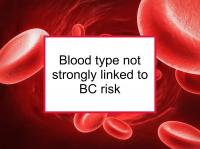Since blood type is determined by genetic factors, it is plausible that some cancers might be associated with specific blood types. In fact, associations between blood type and risk have been reported for some cancers. However, studies concerning blood type and breast cancer have been few and contradictory.
Blood type and breast cancer risk
Some recent studies have reported that blood type A appears to be associated with higher breast cancer risk than other blood types. However, type B has also been found to be linked to breast cancer risk and some studies have found no association. We present the available findings below, but caution that many of the studies are small or of poor quality:
- A 2025 meta-analysis of 29 previous case-control studies reported that blood type A was associated with increased risk of breast cancer; no other blood type had an association. Rh factor showed no significant association with breast cancer
- A 2024 Chinese study reported that non-O blood type was associated with positive lynch nodes
- A 2022 study found that men with breast cancer were more likely to have type AB blood than normal controls whereas having O blood type appeared to be protective
- A small 2019 Greek study found a significant correlation between breast cancer and blood group A
- A Saudi study reported that women with blood type A had a relatively high incidence of breast, as did women with Rh positive blood
- A meta-analysis of previous case-control studies and cohort studies with at least 100 cancer cases reported that blood type A was associated with increased risk of breast cancer, whereas blood type O was associated with decreased risk of breast cancer
- A large meta-analysis of previous studies concerning blood type and breast cancer incidence reported that whites with blood type A might had a higher risk of breast cancer than other white women
- A large U.S. study found no associations between breast cancer risk or breast cancer mortality and blood type
- A Greek study reported that among women with Rh positive blood, those with a family history of breast cancer were more often found to have type A blood than AB or B. Ductal breast cancer was found to be rare among women with AB+ blood type. In addition, the risk of distant metastasis was higher for those with type A blood than other blood groups and was especially high among those with A- blood
- A U.S. study found that women with breast cancer were more likely to be type B and less likely to be type AB. The same study found no relationship between blood type and five-year breast cancer-specific survival
- A study conducted in Uruguay found that Rh negative status was associated with increased risk of breast cancer. A history of breast cancer in first degree relatives was also found to be strongly associated with Rh negative blood type
- An Icelandic study found that women with a history of breast cancer in first degree relatives were more likely to have type B blood. Furthermore, cancer-free relatives of such women were less likely to have type B blood
- An Turkish study found no relationship between HER2 positive breast cancer and blood type or Rh factor
- A U.S. study reported that among women with a family history of breast cancer, blood type O tended to be more prevalent among women diagnosed at a relatively young age (20 to 44 years), whereas blood type A was more common among women with later diagnoses (45 to 84 years)
- A 1990 study reported that breast cancer patients with type O blood had a significantly lower risk of death than those with A, B or AB blood types.
Basing diet on blood type
Interest in the topic of the relationships between blood type, diet, and health (including risk of cancer) was heightened with the publication of the book, Eat Right 4 Your Type by Peter D'Adamo in 1996. The book describes a theory of healthy eating for the main blood types that is based on the adaptations that human beings have made over time as a result of migration and changes in habitat. Under this theory, type A arose during the change from hunter-gatherer to an agrarian lifestyle, type B developed out of the migration and merging of the peoples from the African homeland to Europe, Asia and the Americas, type O evolved with the ascent of humans to the top of the food chain, and type AB arrived with the modern intermingling of the disparate groups. Like Paleolithic and raw food diet, the underlying premise of eating right for your blood type is that the healthiest diet for a given individual is a version of the diet of his ancestors.
The conclusions offered with respect to diet under D'Adamo's theory for the most part have not been tested empirically. Indeed, it would be very difficult to devise studies to attempt to verify such a broad-based and multi-faceted theory. For those who are committed to following the precepts set out in Eat Right 4 Your Type and related publications, we suggest comparing your recommended diet with the foods in our lists of recommended foods and foods to avoid and making appropriate adjustments.
Sources of information provided in this webpage
The information above, which is updated continually as new research becomes available, has been developed based on the results of academic studies. Clicking on any of the underlined words will take you to its tag or webpage, which contain more extensive information.
Below are links to 20 studies concerning this topic. For a more complete list of studies, please click on blood type.
